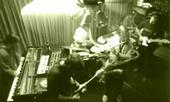CityBeat fall 2003? who knows.....the start of CB's strange fixation
on labelling anything outside their comfort zone "weird"....
WEIRD
Circumvention Music jumpstarts
San Diego’s improv music scene
by Caley Cook
A trumpet shrieks through a speaker propped up against the wall.
Breeeep!
Breeep… Breeeeep!!
Then, just a few minutes after I enter the room and sit in a comfy
rolling chair, a saxophone oozes from one note of sex-crazed, humping
weakness to another, lodging itself soundly into the mood of the evening.
This is an icebreaker—done freewheeling improv-jazz-style—and
it’s the weirdest thing I’ve ever heard.
Maybe it’s not that Nathan Hubbard and Jason Robinson’s music
is so weird, per say. It’s just that it’s set up within such
aching normality.
Leaning against the side of the building that houses the Trummerflora
performance space in Mission Hills, Hubbard is lipping his beer while
Robinson finishes up a conversation on his cell phone. It’s a strictly
normal scene in the Average American Joe sense, punctuated by the normal
street noise from Washington Ave. and the normal suits walking home
from their normal day at their normal offices.
Perhaps its this aberration among the routine that makes the music
so abnormal. Gone are the fence-hugging, chain-smoking, bar-doddling
contradictions of normal American rock. Gone are the images of average
jazz radio temptresses donning the requisite black dress and the usual
strappy shoes. Gone are the broken-home, road-poet jazz stereotypes.
Left in this vacated place is La Jolla-based Circumvention Music and
its two freewheeling, albeit normal-looking cohorts.
“We’re a big paradox,” Robinson chuckles. “We love
this music and we’re trying to build an audience in San Diego,
but people have to hear it first.”
Hubbard and Robinson are the lifeblood of the improvisational and experimental
music that circulates in San Diego. The music is disseminated by Trummerflora,
a performance collective, and through Circumvention and Accretions,
the record labels. Through all three parades an endless cast of working
ensembles and their players: Cosmologic, Donkey, Return to One, Skeleton
Key Orchestra and Wormhole to name very few.
The musicians—Hubbard, Robinson, Hans Fjellestad, Robert Montoya,
Gustavo Aguilar, Michael Dessen, Marcelo Radulovich, Marcos Fernandes
and infinite others—make up the revolving Mickey Mouse Club of
the San Diego improvisational music scene. Hubbard is head mouse.
In 1998, Hubbard surfaced with his own saxophone-centered solo project
and had nowhere to release it. In a no-risk jazz music industry—both
locally and nationally—he says, creation gets caught up in the
cogs of “market research.” What results are best-of albums
that recycle the same old John Coltrane hits year after year. As good
as those hits sound, Hubbard wanted to give rise to an outlet for creative
music to “circumvent” the regular market cycle—thus,
Circumvention Music was born.
When Robinson moved to San Diego to continue his music education at
UCSD—he is currently finishing a dissertation for his doctorate—he
met Hubbard, a drummer, and immediately formed a musical bond in the
band Cosmologic. This music, they say, is all about the bonds it creates.
“People see this music as an anti-social kind of thing from the
ivory tower above,” says Robinson, “but this sound is based
on interaction.”
“This is a social sound,” agrees Hubbard. “All we want
to do is create a documentation of being in one specific place at one
specific time, and there are so many things that are just waiting to
be documented.”
The current surroundings of the Trummerflora performance space have
more of a mildewed college-theater feel than the pulsating musical freeway
that it really is. “It’s hard to believe that there is a vibrant
concert series based in this room,” Robinson admits.
But the artist-run structure of Circumvention and their dedication
to supporting and publishing improvised music is more than enough motivation
to create something new each day, say its directors. The Circumvention
website lists seven releases spanning just a few months.
Hubbard seemingly never gets tired of drumming on many of these releases.
On disc after disc he is wailing the crap out of all sorts of percussive
devices. The soles of his shoes are even worn to a thin round.
“I feel very fortunate to be part of the San Diego scene,”
says Robinson. “Right now, there is so much happening and everyone
involved in Circumvention or Accretions or Trummerflora is individually
and in their own right very serious about this music and what they are
creating.”
“You can’t put this stuff on a record label,” continues
Hubbard. “The [record executives] would be tapping the table and
saying, ‘Soooo, where’s the hit?’”
“This is such a labor of love,” says Robinson. “Money
doesn’t enter the picture.”
You have to love this music to make it. Rushing and flowing from one
note to the next, three or four or five instruments often pile on top
of each other. Sax and trombone and bass and bells and drums and flute
and shakers and electronics and guitar and trumpet and piano all leap
into the air headfirst and land, sprawled out in a huge heap, just waiting
for someone to mentally organize their mess.
This music is weird, without a doubt. But the weirdest thing about
it isn’t the beats or the instruments or the timing or the volume
or even its players. The weirdest thing about the whole scene is that
this music is flourishing in San Diego and nary a soul knows about it.
Visit www.circumventionmusic.com or www.trummerflora.com. |
